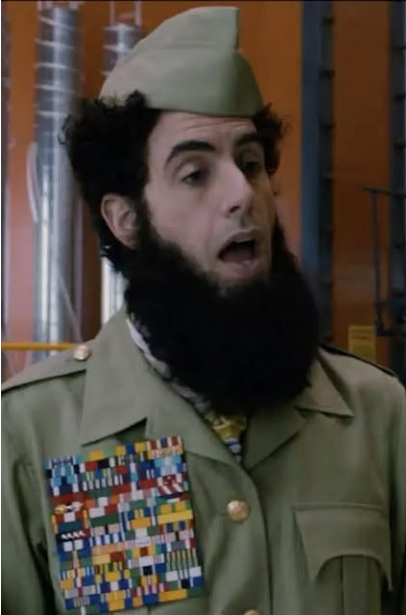
Film Writer Cassandra Fong revisits 2012’s The Dictator, finding it to be a politically-incorrect comedy that has become horrifically prescient over time
Content warning: descriptions of anti-Semitism, bigotry, racism, sexism, suicide
How can a film about a racist, sexist, anti-Semitic dictator of his own deprived and disadvantaged country be comedic? Answer: bring him to New York. Sacha Baron Cohen’s fourth feature film, The Dictator, is an unrestrained and unusually sordid political satire in the tradition of its namesake The Great Dictator. Despite it being released over a decade ago, the story of Admiral General Aladeen’s journey to regain his rank and identity after he is kidnapped by his disloyal uncle’s agents still holds up.
A film that took less opportunities to joke about everyone under the sun would paradoxically be more offensive than what Cohen does here: embrace the gross-out, the grotesque, the farcical slapstick and the conventionally contrived gags in equal measure. Oh, and deviate not a single jot from the conventions of a fish-out-of-water newcomer. Even if that newcomer is an oppressive anti-Semitic, racist and misogynistic autocrat who is indifferent to the suffering of his subjects and intends to commit genocide through nuclear weapons, and proud of it to the point that he even snaps out of a suicidal fugue by hearing himself referred to as the last great dictator. As Aladeen navigates through a world that is both foreign and threatening to his sense of authority, he clings to his toxic masculinity, his outright racism, and his deeply ingrained anti-Semitism. He’s a character so out of touch with reality that he is constantly playing catch-up, and it’s that very disconnect that forms the foundation of much of the film’s humour.
His disconnect with reality fuels the comedy of the film
The soundtrack is assuredly a highlight, injecting a sense of cultural dissonance into the film’s otherwise familiar musical cues. These covers are both absurd and strangely fitting—offering a jarring reminder of the ways in which global cultures have collided, and the disparities that emerge when different worlds intersect. Arabic-language covers of English pop hits, including Dr. Dre’s The Next Episode? Surprisingly, it is a strong musical showing that completely works and adds to the mad hilarity of this film, cranking the unsavoury characteristics of the titular dictator all the way up and more as he transitions from being the all-powerful despot of Wadiya to a poor refugee working in an American grocery store. And, of course, falls in love with the politically outspoken woman who runs it after she defends him from being arrested due to a white couple overhearing a surprisingly innocuous conversation he had with his former nuclear engineer in a helicopter. Yes, there is a lot in this film that makes just as much sense in context as it does out of it.
The film elicits a deep sense of deep underlying horror
And yet, rewatching it so many years after its release with knowledge of geopolitical developments that could not be foreseen when it was filmed, so much of the humour elicits a deep sense of underlying horror. The ending speech comparing America’s questionable actions to a dictatorship feels less like exaggeration and more like description; at the time it must have been a wink at Charlie Chaplin’s wordier paean to democracy, but different times call for different interpretations. And so what if we don’t know whether the character or audience is meant to be the butt of the joke? It is not mockery now to say that power-mad leaders bent on world domination pose a dire threat in the way they rise to occasion with political oratory on self-determination and civil rights that turns the tables on everything we thought we could take for granted. While The Dictator may still be intended as a comedic critique of tyrannical figures, it resonates much more deeply in a world where the lines between democracy and dictatorship have become increasingly difficult to discern.
Enjoyed this? Read more from Redbrick Film

Comments